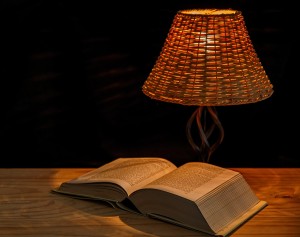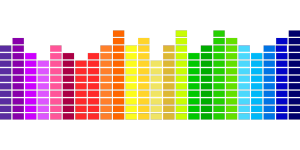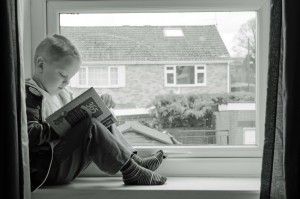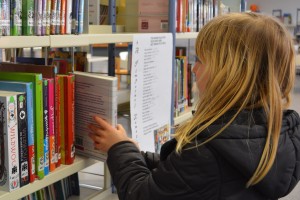 Reading is a complex activity. When we read we assimilate and process lots of information. There are the words themselves and their meaning, and how, together, they form a narrative, telling of actions or occurrences. To this add the suggestive elements – word-images and metaphors, the subtle word-prompts which access existing knowledge or memory and trigger a mood or atmosphere. Then, on top of it all, our imaginations re-produce this information in another form, such as what a character looks like. Often we say that we can ‘see’ this or that character, or ‘hear’ his or her voice. We create whole scenes and backgrounds to that character’s actions, creating mental images of places which don’t exist anywhere else but in our heads. Our senses ‘experience’ the imagined events – we ‘smell’ the newly baked bread which is placed on a fictional kitchen table. We ‘feel’ the heat of a firestorm raging through war-time London streets.
Reading is a complex activity. When we read we assimilate and process lots of information. There are the words themselves and their meaning, and how, together, they form a narrative, telling of actions or occurrences. To this add the suggestive elements – word-images and metaphors, the subtle word-prompts which access existing knowledge or memory and trigger a mood or atmosphere. Then, on top of it all, our imaginations re-produce this information in another form, such as what a character looks like. Often we say that we can ‘see’ this or that character, or ‘hear’ his or her voice. We create whole scenes and backgrounds to that character’s actions, creating mental images of places which don’t exist anywhere else but in our heads. Our senses ‘experience’ the imagined events – we ‘smell’ the newly baked bread which is placed on a fictional kitchen table. We ‘feel’ the heat of a firestorm raging through war-time London streets.
But the primary sense which we use to relate to and exist within the world is visual, not aural. How many of us re-create in our heads the voices of the characters we read about and are we logical and consistent about it? Do Thomas Hardy’s characters all speak with a Wessex accent, strong or weak, for you? Not for me. Gabriel Oak and Farmer Boldwood do, but not Bathsheba Everdene or Sergeant Troy. Do the characters in ‘Kidnapped’ (the English aside) all have Scottish accents? Again, for me, no.
characters we read about and are we logical and consistent about it? Do Thomas Hardy’s characters all speak with a Wessex accent, strong or weak, for you? Not for me. Gabriel Oak and Farmer Boldwood do, but not Bathsheba Everdene or Sergeant Troy. Do the characters in ‘Kidnapped’ (the English aside) all have Scottish accents? Again, for me, no.
And what if a reader doesn’t know what a certain accent sounds like? Or if his or her frame of reference doesn’t encompass what a word describes? African writers now writing in English have described their childhood confusion when reading British ‘children’s classics’ in school, when the activities, let alone the words which  described them, were entirely unknown to them. And, when our vocabularies are still forming, we all have our unpronounced words, words only read and not yet spoken. One of mine was ‘awry’, which I always read pronounced in my head as ‘orey’. When someone first said ‘Awry’ to me in the correct manner, I didn’t recognise the word.
described them, were entirely unknown to them. And, when our vocabularies are still forming, we all have our unpronounced words, words only read and not yet spoken. One of mine was ‘awry’, which I always read pronounced in my head as ‘orey’. When someone first said ‘Awry’ to me in the correct manner, I didn’t recognise the word.
I suspect the answers to these questions depend on a large range of factors, aside from frame of reference and acquired vocabulary. Is the way in which a character speaks described to the reader? Does a character have a specific vocal trait, like a lisp, which informs how he or she might sound? Or do they over-use certain words or phrases which makes what they say distinctive? Lots of Dickens’ characters have one, the other, or both. It’s part of what makes them so particularly themselves (and sometimes adds to their grotesquery).
Have the characters been portrayed on film, radio or television? When I read ‘To Kill A Mockingbird’ I hear, as well as see, Gregory Peck as Atticus Finch. Sir Ian McKellan isn’t my Gandalf – that’s not how Gandalf looks to me, even with the correct props – though his voice is closer to my Gandalf’s. Donald Pleasance, an actor so famous for his sinister villains, will always be, for me, the near-saintly Mr Harding of Hyram’s Hospital, his voice was so precisely how I heard Mr Harding from the page. Likewise, Alan Rickman’s Obadiah Slope, the voice of ambitious, wheeling-dealing and unscrupulous underlings everywhere (the BBC Drama department has a lot to answer for in my case).
Donald Pleasance, an actor so famous for his sinister villains, will always be, for me, the near-saintly Mr Harding of Hyram’s Hospital, his voice was so precisely how I heard Mr Harding from the page. Likewise, Alan Rickman’s Obadiah Slope, the voice of ambitious, wheeling-dealing and unscrupulous underlings everywhere (the BBC Drama department has a lot to answer for in my case).
So, how does a writer help an actor or actress who is about to say their characters’ words? This is the question I am grappling with right now. I have drafted some notes, general background on my village and some suggestions as regards voices – but these are almost all to do with accents. Elizabeth, my collaborator in producing the audio version of The Village, admitted to being daunted by the notes, at first, reading and re-reading them, so to be sure of not making a mistake. At that point I realised that, actually, just general guidance would do. Elizabeth is much better placed to be able to create the sound of my characters – she doesn’t have any preconceptions about them.
 However proprietorial I feel about the characters I created, they have left me and gone on to belong to the readers who now read about them. J.R.R.Tolkein may have created Gandalf, but, as you see above, he is mine now. And everyone else’s.
However proprietorial I feel about the characters I created, they have left me and gone on to belong to the readers who now read about them. J.R.R.Tolkein may have created Gandalf, but, as you see above, he is mine now. And everyone else’s.
With apologies to all those eminent students of language and linguistic development whom I studied so long ago.
If you enjoyed reading this blog piece try Oh to be in England… and The Making of an Audio-book


 RSS – Posts
RSS – Posts
Pingback: ‘The Village’ Audio-book | The Village